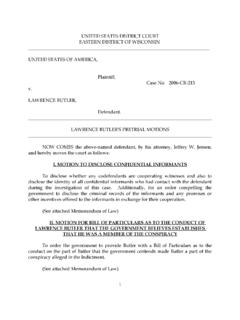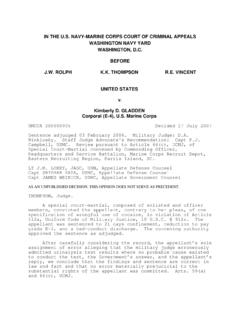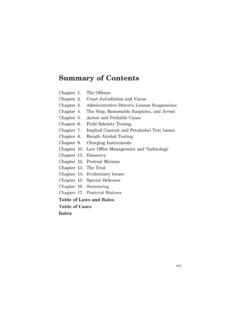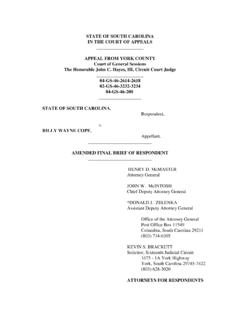Transcription of A District Court grants, in part, and denies, in part, a ...
1 A District Court grants, in part, and denies, in part, a Defendant's motion to suppress after concluding that some of the statements that he made to law enforcement officers were made in violation of his Constitutional rights while others were not February 2018. For duplication & redistribution of this article, please contact Public Agency Training Council by phone at PATC 5235 Decatur Blvd Indianapolis, IN 46241. Article Source : In United States v. Butler, 20147 WL 6089072 ( Mo. Dec. 7, 2017), Defendant William H. Butler moved the United States District Court for the Western District of Missouri to suppress certain physical evidence and the statements that he made to law enforcement officers.
2 Butler asserted that his statements to law enforcement officers were made and that the physical evidence was obtained in violation of his Fourth and Fifth Amendment rights. The District Judge referred Butler's motion to a United States Magistrate Judge who conducted an evidentiary hearing on Butler's motion to suppress. At the conclusion of the hearing, the Magistrate Judge made the following findings of fact, rendered the following conclusions of law, and recommended to the District Judge that he grant, in part, and deny, in part, Butler's motion to suppress. On July 21, 2013, Sugar Creek Missouri Police Department Chief Herb Soule advised Sgt.
3 Kirk Beeman that a complaint had been registered about suspected drug activity at a Sugar Creek apartment complex. After receiving the information, Sgt. Beeman and Patrol Officer Josko Wrabec in separate marked police vehicles . conducted surveillance of the apartment complex beginning at approximately 4:00 While conducting the surveillance, Sgt. Beeman observed a car with several occupants pull up to the complex and park in the back alley. The car's driver entered the complex and, then, left in his car after being in the apartment complex for less than a minute. Thereafter, Sgt. Beeman radioed Officer Wrabec and requested that he conduct a stop of the vehicle.
4 During the ensuing traffic stop, one of the car's occupants told the officers that they had gone to the apartment complex and purchased a small amount of marijuana. The occupant described the location of the apartment and said that he bought the marijuana from a black male named Will. Based on the information, Sgt. Beeman and Officer Wrabec decided to conduct a knock and talk at the described apartment. At approximately 7:34 , Sgt. Beeman and Officer Wrabec (both in uniform) knocked on the door of Apartment 3 (the location described by the witness) of the apartment complex. Butler answered the door, stepped outside the apartment into the hallway, and shut the door behind him.
5 Sgt. Beeman explained to Butler that there were some indications that illegal drugs were being sold out of his apartment. Butler responded: Man, all I have is a little bit in my pipe, and it's just for personal use. Butler confirmed that he lived in the apartment with his girlfriend and that both of them were on the lease. Subsequently, Sgt. Beeman showed Butler a consent-to-search form and requested Butler to consent to a search of the apartment. Sgt. Beeman read the consent-to-search form out loud and asked Butler to sign. In part, the form specifically provides that Butler was acknowledging that he had been informed of his constitutional right not to have a search made of the premises and property.
6 Butler initially responded to Sgt. Beeman that he would go inside and retrieve the marijuana that he had, and if the officers would return in ten minutes, it will be gone. Butler then reached for the doorknob to go inside. 2018 Online Article: Link to article online: However, Sgt. Beeman stopped Butler from going back into the apartment and asked Butler if there were weapons or other individuals in the apartment. Butler said that he was home alone and that he had some swords hanging inside the doorway and maybe a BB gun.. Sgt. Beeman then told Butler that he could not go back into the apartment until he consented to a search or refused to consent to a search.
7 Butler responded: If I don't sign that form, you will just come back with a search warrant, and then [I will be] questioned, won't you? Sergeant Beeman stated that was a possibility. Butler then said: I don't sell to nobody. I smoke marijuana with friends sometimes. I have some weed inside, but it's for my personal stash. And I take a few Xanax. Thereafter, Butler signed the consent-to-search form and was told by Sgt. Beeman that he could revoke the consent at any point. Before entering the apartment, Sgt. Beeman asked Butler if he was a convicted felon, and Butler indicated that he thought he had some drug things and unlawful possession of a gun in the past.
8 When Butler and the officers entered the apartment, Butler attempted to take a seat in a cushioned chair. Sgt. Beeman after placing Butler on a couch searched the area around the chair and found 163 grams of marijuana (in containers on an adjacent end table) and a loaded, silver-colored handgun (in the cushions of the chair). As a result of the discovery of this contraband, Officer Wrabec handcuffed Butler. Butler never revoked the consent to search. In his motion to suppress, Butler argued that Sgt. Beeman and Officer Wrabec violated both his Fourth and his Fifth Amendment rights during the encounter at his apartment on July 21, 2013.
9 As a result, Butler moved the District Court to suppress the physical evidence obtained at his apartment and to suppress the statements that he made to the law enforcement officers. The Magistrate Judge began his analysis of Butler's motion to suppress by noting that the initial knock and talk performed by the officers was valid because a mere knock and talk does not implicate the Fourth Amendment because no seizure occurs. United States v. McDaniel, 2017 WL 706630, * 4 ( Mo. Feb. 22, 2017). Instead, a knock and talk is an investigatory technique in which law enforcement officers approach the door of a dwelling seeking voluntary conversation and consent to search.
10 The Magistrate Judge noted, however, that an initial knock and talk could morph into something more that could raise constitutional concerns. Here, the Magistrate Judge stated that it was undisputed that Butler was not apprised of his Miranda rights during the encounter with the officers. As such, the question became whether Butler was in custody and was being interrogated which would trigger his right to Constitutional protections. In answering this question, the Magistrate Judge divided Butler's encounter with the police into two parts: (1) before Sgt. Beeman stopped Butler from entering his apartment and (2) after Sgt.











